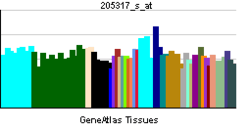SLC15A2
Solute carrier family 15 (H+/peptide transporter), member 2, also known as SLC15A2, is a human gene.[3]
See also
References
Further reading
- Liu W, Liang R, Ramamoorthy S, et al. (1995). "Molecular cloning of PEPT 2, a new member of the H+/peptide cotransporter family, from human kidney.". Biochim. Biophys. Acta. 1235 (2): 461–6. doi:10.1016/0005-2736(95)80036-F. PMID 7756356.
- Döring F, Martini C, Walter J, Daniel H (2002). "Importance of a small N-terminal region in mammalian peptide transporters for substrate affinity and function.". J. Membr. Biol. 186 (2): 55–62. doi:10.1007/s00232-001-0135-9. PMID 11944083.
- Alcorn J, Lu X, Moscow JA, McNamara PJ (2002). "Transporter gene expression in lactating and nonlactating human mammary epithelial cells using real-time reverse transcription-polymerase chain reaction.". J. Pharmacol. Exp. Ther. 303 (2): 487–96. doi:10.1124/jpet.102.038315. PMID 12388627.
- Strausberg RL, Feingold EA, Grouse LH, et al. (2003). "Generation and initial analysis of more than 15,000 full-length human and mouse cDNA sequences.". Proc. Natl. Acad. Sci. U.S.A. 99 (26): 16899–903. doi:10.1073/pnas.242603899. PMC 139241
 . PMID 12477932.
. PMID 12477932.
- Groneberg DA (2003). "[Expression, localization and functional aspects of the peptide transporter PEPT2 in the normal respiratory tract and in cystic fibrosis]". Pneumologie (Stuttgart, Germany). 57 (2): 104–5. doi:10.1055/s-2003-37158. PMID 12579467.
- Terada T, Irie M, Okuda M, Inui K (2004). "Genetic variant Arg57His in human H+/peptide cotransporter 2 causes a complete loss of transport function.". Biochem. Biophys. Res. Commun. 316 (2): 416–20. doi:10.1016/j.bbrc.2004.02.063. PMID 15020234.
- Pinsonneault J, Nielsen CU, Sadée W (2005). "Genetic variants of the human H+/dipeptide transporter PEPT2: analysis of haplotype functions.". J. Pharmacol. Exp. Ther. 311 (3): 1088–96. doi:10.1124/jpet.104.073098. PMID 15282265.
- Bahadduri PM, D'Souza VM, Pinsonneault JK, et al. (2005). "Functional characterization of the peptide transporter PEPT2 in primary cultures of human upper airway epithelium.". Am. J. Respir. Cell Mol. Biol. 32 (4): 319–25. doi:10.1165/rcmb.2004-0322OC. PMID 15626774.
- Zhang EY, Emerick RM, Pak YA, et al. (2005). "Comparison of human and monkey peptide transporters: PEPT1 and PEPT2.". Mol. Pharm. 1 (3): 201–10. doi:10.1021/mp0499712. PMID 15981923.
- Noshiro R, Anzai N, Sakata T, et al. (2006). "The PDZ domain protein PDZK1 interacts with human peptide transporter PEPT2 and enhances its transport activity.". Kidney Int. 70 (2): 275–82. doi:10.1038/sj.ki.5001522. PMID 16738539.
- Søndergaard H, Bravo S, Nielsen CU, et al. (2008). "Cloning of the pig PEPT2 (pPEPT2) and characterization of the effects of epidermal growth factor (EGF) on pPEPT2-mediated peptide uptake in the renal porcine cell line LLC-PK1.". Eur. J. Pharm. Sci. 33 (4): 332–42. doi:10.1016/j.ejps.2008.01.001. PMID 18295462.
|
|---|
|
| By group |
|---|
| | SLC1–10 |
|---|
| | (1): | |
|---|
| | (2): | |
|---|
| | (3): | |
|---|
| | (4): | |
|---|
| | (5): | |
|---|
| | (6): | |
|---|
| | (7): | |
|---|
| | (8): | |
|---|
| | (9): | |
|---|
| | (10): | |
|---|
|
| | | SLC11–20 |
|---|
| | (11): |
- proton coupled metal ion transporter
|
|---|
| | (12): | |
|---|
| | (13): |
- human Na+-sulfate/carboxylate cotransporter
|
|---|
| | (14): | |
|---|
| | (15): |
- proton oligopeptide cotransporter
|
|---|
| | (16): |
- monocarboxylate transporter
|
|---|
| | (17): | |
|---|
| | (18): | |
|---|
| | (19): | |
|---|
| | (20): | |
|---|
|
| | | SLC21–30 |
|---|
| | (21): | |
|---|
| | (22): | |
|---|
| | (23): |
- Na+-dependent ascorbic acid transporter
|
|---|
| | (24): | |
|---|
| | (25): | |
|---|
| | (26): |
- multifunctional anion exchanger
|
|---|
| | (27): | |
|---|
| | (28): |
- Na+-coupled nucleoside transport (SLC28A1
|
|---|
| | (29): |
- facilitative nucleoside transporter
|
|---|
| | (30): | |
|---|
|
| | | SLC31–40 |
|---|
| | (31): | |
|---|
| | (32): | |
|---|
| | (33): | |
|---|
| | (34): |
- type II Na+-phosphate cotransporter
|
|---|
| | (35): |
- nucleoside-sugar transporter
-
-
-
-
- SLC35E1
- SLC35E2
- SLC35E3
- SLC35E4
|
|---|
| | (36): |
- proton-coupled amino-acid transporter
|
|---|
| | (37): |
- sugar-phosphate/phosphate exchanger
|
|---|
| | (38): |
- System A & N, sodium-coupled neutral amino-acid transporter
|
|---|
| | (39): | |
|---|
| | (40): |
- basolateral iron transporter
|
|---|
|
| | | SLC41–48 |
|---|
| | (41): | |
|---|
| | (42): | |
|---|
| | (43): |
- Na+-independent, system-L like amino-acid transporter
|
|---|
| | (44): | |
|---|
| | (45): |
- Putative sugar transporter
|
|---|
| | (46): | |
|---|
| | (47): | |
|---|
| | (48): | |
|---|
|
| | |
|
|
|
|
|
see also solute carrier disorders |


 . PMID 12477932.
. PMID 12477932.